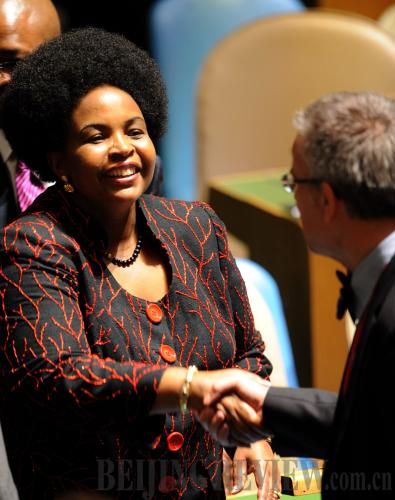|
 |
|
WELCOME: South Africa joins the UNSC club (SHEN HONG) |
NEW OIL LAW
Nigeria
Nigeria's parliament will soon adopt a new law governing the country's oil industry. The bill, which promises widespread petroleum industry reforms was expected to be passed in late August, but ran aground on the opposition of international oil companies. The law is seen as a means for Nigeria to achieve ambitious economic development goals while promoting greater social stability and reducing environmental damage. Nigeria aims to be one of the world's top 20 economies by 2020 while at the same time becoming neutral on carbon output by 2025.
FEMALE FLIGHT CAPTAIN
Ethiopia
Ethiopian Airlines has officially appointed its first female commercial flight captain. Local media reports that Captain Amsale Gualu Endegnanew joined Ethiopian Airlines Pilot Training School in 2000 and started her career as first officer in 2002. She has worked on Fokker-50, 757 and 767 aircraft as first officer since then. Amsale took off on her first flight as captain on a Q-400 aircraft from Addis Ababa to Bahir Dar.
TOBACCO BOOSTS ECONOMY
Zimbabwe
Zimbabwe's economy is expected to see a major rebound in the second half of the year with an estimated 8.1 percent growth due to its increased tobacco production. The annual tobacco crop output surpassed the initial 77,000 tons anticipated at the start of the year. A record 122,000 tons have been sold during the selling season.
3G NETWORK UP
Malawi
The telecommunication service provider Zain-Airtel Malawi has landed the third generation (3G) mobile phone network in the country. The 3G networks will help mobile phone users to make uninterrupted phone calls for longer distances thanks to wider coverage and access data services such as Internet at faster speeds than previously. Users using the 3G networks will also be able to make video calls, and download videos and pictures quickly all at affordable rates.
RISING POWER COSTS
Zambia
Zambia's state power utility Zesco Ltd. has started negotiating higher electricity prices with foreign mining companies, yet didn't reveal by how much. The energy minister said that it is also in the interest of the mines that the cost of power goes up because there will be no electricity if the country does not invest in new generation facilities. Foreign mining companies operating in Zambia include Canada's First Quantum Minerals, London-listed Vedanta Resources Plc, Equinox Minerals, Glencore International AG of Switzerland and South Africa's Metorex.
UNSC MEMBERSHIP
South Africa
South Africa clinched 182 votes in a plenary session of the UN General Assembly to become a non-permanent member of the UN Security Council for a two-year term, beginning January 2011. Five new non-permanent representatives were voted in to replace the outgoing Austria, Japan, Mexico, Turkey and Uganda, who are scheduled to vacate their seats at the end of this year. The other four elected are India (187 votes), Colombia (186 votes), Portugal (150 votes) and Germany (128 votes).
REFERENDUM GO AHEAD
Sudan
Sudan's Foreign Minister Ali Karti said the government "won't object" if southerners vote for independence in the upcoming referendum on January 9 next year. Officials have insisted they would respect the vote's outcome and would work to make the Southern Referendum take place on time and in line with international obligations. Sudan has set November 14 as the beginning of voter registration. The January referendum is required by a 2005 peace agreement that ended the 21-year war between Sudan's predominantly Arab and Muslim north and rebels in the largely Christian-animist south.
STOCKING UP
Kenya
Kenya plans to double grain reserves as a buffer against any shortages next year, following forecasts that the country would receive less rainfall, which could harm output. Meteorologists said rainfall during Kenya's short rainy season later this year is expected to be less than usual and that the first half of 2011 also looks to be dry. The government is trying to buy and increase the grain reserve requirement from 4 million (90 kg) bags to 8 million bags.
MDGS ON TRACK
Uganda
World Bank (WB) Vice President for Africa Obiageli Ezekwesili said Uganda is among the few Sub-Saharan African countries on track to achieve the Millennium Development Goals (MDGs) by 2015. According to WB, the economic outlook for Sub-Saharan Africa has withstood the global recession. Economic growth is projected to expand to 4.9 percent in 2010 from 1.8 percent in 2009. WB's economic outlook named Uganda, Cape Verde, Ghana and Tanzania as the few Sub-Saharan Africa countries that "consistently had strong policies." |